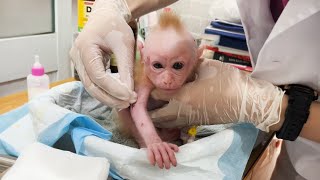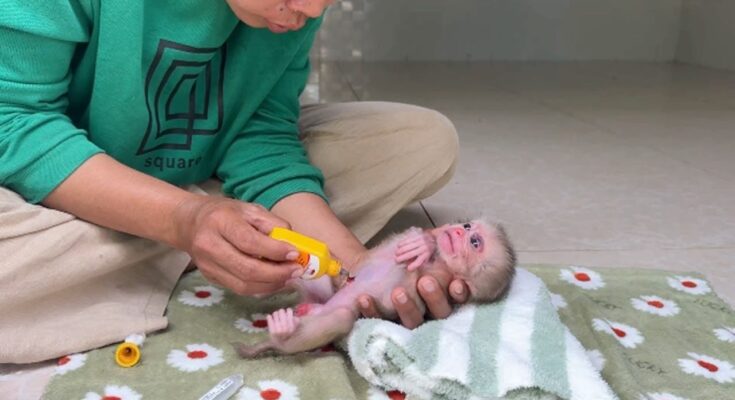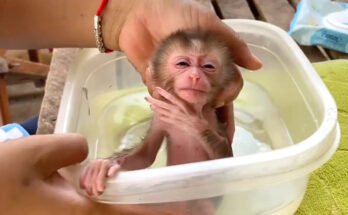Discover Essential Tips for Raising a Newborn Baby Monkey! 🐒✨ From bonding basics to health care, learn how to give your baby monkey the best start. Dive into the world of primate parenting and uncover expert advice on nutrition, safe handling, and creating a nurturing environment. Whether you’re a first-time caregiver or an animal enthusiast, these tips will help ensure your little one’s growth and happiness. Start your journey with confidence!
In a touching display of care and compassion, a mother monkey lovingly tends to her newborn by cleaning its umbilical cord with Betadine after a bath. This simple yet profound act highlights the nurturing instincts that many animal mothers exhibit towards their young, ensuring their well-being even in the most vulnerable moments.
A Mother’s Love and Care
After giving her baby a bath, the mother monkey takes extra steps to ensure her baby is safe and healthy. Using Betadine, a common antiseptic, she carefully cleans the umbilical cord to prevent infection and promote healing. This attention to detail shows the depth of the maternal bond and the natural instincts that drive animals to care for their young in the wild.
The Importance of Hygiene for Newborns
Newborns, whether human or animal, are highly susceptible to infections and illnesses. For the baby monkey, keeping the umbilical cord clean is essential to its survival and health. Betadine, with its antiseptic properties, helps protect the baby from any potential harmful bacteria, offering a simple solution to an important problem.
A Lesson in Parental Responsibility
This act of care is a reminder that parental responsibility in the animal kingdom is not just about feeding and protecting—it’s also about attending to the small, often overlooked details. The mother monkey’s actions reflect an instinctive understanding of how to keep her baby safe and healthy in its early, fragile days of life.
The Role of Humans in Protecting Wildlife
While animal mothers like this monkey perform remarkable acts of care, it’s crucial for humans to recognize the need to protect these creatures and their natural habitats. Conservation efforts ensure that these animals can continue to care for their young in safe environments, free from the threats of habitat loss or human interference.
What Happened to This Poor Baby Monkey That Needed Surgery?

Caring for Your Newborn Baby Monkey Made Easy! 🐒✨ Discover vital care tips that cover everything from feeding to playtime. Equip yourself with knowledge for a successful start in your monkey’s life. Click now to learn how to create a nurturing home!
Baby monkeys are incredibly fascinating creatures with a mix of intelligence, curiosity, and playfulness that captures the hearts of many. Here are some interesting facts about baby monkeys:
Step-by-Step Guide to Feeding a Baby Monkey 🍼🐒
- Understand Their Diet
Baby monkeys require a diet similar to what they’d consume in the wild. Start with specialized milk formulas for primates or fruits like bananas and papayas. - Sanitize Feeding Tools
Always use clean bottles, syringes, or bowls to prevent infections. Hygiene is crucial for their health. - Feed Small Portions
Begin with small amounts to avoid overfeeding. Monitor how much they eat to adjust as they grow. - Maintain a Feeding Schedule
Feed baby monkeys every 2–3 hours for newborns, gradually spacing it out as they age. - Observe Behavior
Watch for signs of hunger or discomfort. If they seem distressed, consult a vet experienced with exotic animals. - Provide Fresh Water
Ensure they have access to clean water at all times for hydration. - Introduce Solid Foods Gradually
Around 6–8 weeks, begin introducing soft fruits and vegetables alongside milk. - Create a Bond While Feeding
Feeding time is a great opportunity to build trust. Be gentle and patient. - Consult a Vet Regularly
Regular health checks ensure the baby monkey is growing strong and healthy.



